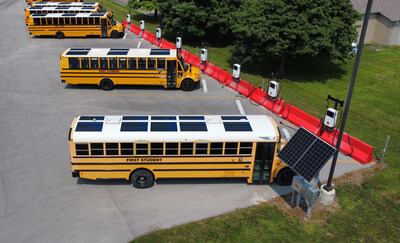Brooklyn to Receive a Charge From Electric School Bus Batteries with New Vehicle-to-Everything Smart Energy Hub Built by First Student and Con Edison
Rhea-AI Summary
First Student and Con Edison are launching a revolutionary demonstration project in Brooklyn, featuring a smart energy hub and 12 electric school buses with solar panels. This initiative aims to support the efficient electrification of school buses while addressing economic barriers for medium and heavy-duty fleet electrification.
The project introduces First Charge, an innovative trenchless power deployment solution that reduces construction costs by at least 30%. It also showcases Vehicle-to-Everything (V2X) technology, allowing bus batteries to generate additional power for Con Edison during peak demand or emergencies.
This demonstration aligns with First Student's commitment to transition 30,000 fossil-fueled school buses to electric by 2035. The company currently has about 2,000 electric school buses under contract across the U.S. and over 360 EVs deployed.
Positive
- Introduction of innovative Vehicle-to-Everything (V2X) technology for efficient power distribution
- Deployment of First Charge solution, reducing construction costs by at least 30%
- Potential cost savings for ratepayers through above-ground infrastructure
- First Student has approximately 2,000 electric school buses under contract across the U.S.
- Commitment to transition 30,000 fossil-fueled school buses to electric by 2035
Negative
- None.
News Market Reaction 1 Alert
On the day this news was published, ED declined 0.53%, reflecting a mild negative market reaction.
Data tracked by StockTitan Argus on the day of publication.
Twelve electric school buses topped with solar panels will also serve local schools as part of revolutionary demonstration project
Through the launch of their innovative demonstration project, a smart energy hub will be deployed to support the speedy and cost-efficient electrification of school buses in the neighborhood. This groundbreaking project will deliver a scalable, cost-optimized solution that addresses economic barriers for medium and heavy-duty fleet electrification, showcasing how to achieve ambitious electrification goals and paving the way for a brighter, greener future.
This novel demonstration project will also include a fleet of 12 electric school buses for
The demonstration project positions
For this project, First Student will deploy its innovative First Charge solution, a trenchless power deployment approach. First Charge reduces construction costs by at least
The project surpasses traditional vehicle-to-grid (V2G) technology, creating a new era of power sourcing: Vehicle-to-Everything (V2X). V2X goes beyond simply plugging electric school bus batteries back into the grid, expanding instead to include the capacity to direct electricity delivery where it is needed. In summer months, when the buses are idle, and energy needs soar, or during emergencies, the smart energy hub significantly increases capacity, generating additional power for Con Edison.
"Harnessing electricity from First Student electric school bus batteries to create an emissions free smart energy hub that can serve a community during peak demand while turbocharging America's fight against climate change is truly revolutionary," said First Student CEO and President John Kenning. "First Student's unparalleled battery storage capacity and pioneering First Charge technology solves an immediate need in many American communities: affordable, clean electricity supply that expands the capabilities of existing power grids. We do this all while providing a better experience for students by putting more electric buses on the roads, creating a safer, more enjoyable ride that's healthier for students and better for the environment."
The demonstration project in
"
"EQT is proud of First Student's work toward accelerating the realization of a clean energy future," said Neha Jatar, Managing Director at EQT Group. "First Student's revolutionary approach toward harnessing advancements in grid technology for school transportation and applying them to other verticals is transformative. We are committed to investing in companies like First Student that are creating the technologies of tomorrow, today."
"Beyond providing healthy, clean transportation for kids, electric school buses represent an opportunity to build energy resilience in communities, which is critical in the face of natural and other emergencies," said Sue Gander, director of World Resources Institute's Electric School Bus Initiative. "By leveraging solar panels and integrated charging technologies, electric school buses can act as giant, mobile batteries, able to store and discharge clean power when not being used for transportation. We are eager to see this project between First Student and Con Edison bring stronger, more resilient grids, as well as a clean ride for kids, to
This demonstration aims to prove how communities can build a critical bridge to planned grid modernization while providing backup power to grids. If needed, the Smart Energy Hub is also capable of supporting emergency services and hospitals, including HVAC, power and lighting.
The technology will allow for significant organizational growth at First Student, building upon the company's operations in 43 states and in partnership with more than 3,000 utilities. It will create new pathways for First Student to deliver more energy storage nationally.
"Our company leads the industry in moving students, and now we are showing the world how to move electrons. We' are proving that a scalable, cost-effective microgrid is possible, and doing it using bus batteries that otherwise would be sitting dormant," said Alex Cook, chief engineer, First Student. "We learned from successful trials in multiple other deployments that combine our innovative charging infrastructure solution with unique energy storage options and dynamic load management software that can deliver a microgrid that is reliable and puts money back into the communities we serve."
"We could not do this without great partners who value innovation and who, like us, prioritize students' well-being and their futures, which means safer rides to school and safeguarding our planet. We thank Con Edison and Bechtel for their commitment to this project and for seeing the potential safety, community and global benefits of using solar power and school bus batteries to do more than just transport children to and from school every day," said Kevin Matthews, head of electrification, First Student.
The implementation of this innovative charging technology is part of First Student's larger electrification goals. The company has made a commitment to transition 30,000 fossil fueled school buses to electric by 2035.
Watch an explainer video on this project.
About First Student
As
About First Services
First Services, a division of First Student, is focused on providing customers with all of First Student's expert transportation services without a full-service transportation contract. Services provided include routing, maintenance, special needs training, and fleet electrification, including the deployment of First Charge, the containerized, above-ground modular charging solution that decreases costs and speeds up EV deployment.
About Con Edison
Con Edison is a subsidiary of Consolidated Edison, Inc. [NYSE: ED], one of the nation's largest investor-owned energy companies, with approximately
Media Contact: Jen Biddinger, First Student, 513.362.4600
![]() View original content to download multimedia:https://www.prnewswire.com/news-releases/brooklyn-to-receive-a-charge-from-electric-school-bus-batteries-with-new-vehicle-to-everything-smart-energy-hub-built-by-first-student-and-con-edison-302282517.html
View original content to download multimedia:https://www.prnewswire.com/news-releases/brooklyn-to-receive-a-charge-from-electric-school-bus-batteries-with-new-vehicle-to-everything-smart-energy-hub-built-by-first-student-and-con-edison-302282517.html
SOURCE First Student









